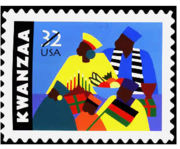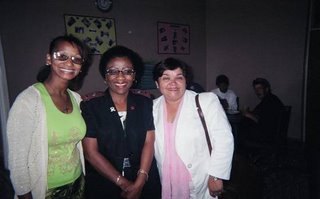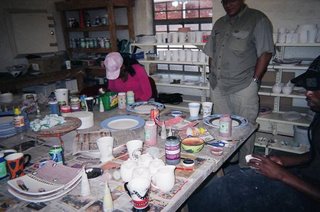Access to Medicines Means Access to Life
 by Erika von Kaschke
by Erika von Kaschke Special to Global Wire
During US tour, Thai activists explain how a trade agreement could limit access to affordable HIV and AIDS drugs.
Sometimes life can come in the form of a bottle. In the case of the half a million people living in Thailand with HIV or AIDS, those bottles are often filled with anti-retroviral medicine.
But lately that medicine has become harder to come by as pharmaceutical corporations have priced poor people out of the market. Five years after the World Trade Organization’s members unanimously reaffirmed developing countries’ rights to produce, export, and import affordable copies of patented drugs, rich country governments keep breaking their promises.
Countries like the US are forcing developing nations to accept free trade agreements that violate the spirit of the WTO’s decision on medicine patents. The provisions contained in US-negotiated free trade agreements would restrict the availability of generic drugs; people who can’t afford brand-name medicines for infectious diseases like HIV/AIDS or for chronic illnesses like diabetes or heart disease would have to go without.
This fall, Oxfam’s partner, the Educational Network for Global and Grassroots Exchange, brought three Thai HIV/AIDS activists to New York, Washington DC, Pennsylvania, Texas, Illinois, Minnesota and California to speak out against the proposed US-Thailand Free Trade Agreement. The tour was part of Oxfam’s campaign to change trade rules that favor rich countries over poor people and company profits over public health.
“Americans don’t know much about the HIV/AIDS epidemic in Thailand or the negative impact that a US free trade agreement would have on the cheap drugs that the government makes,” said Matthew Coghlan, Oxfam’s Regional Trade Policy Officer in East Asia. “This tour gave the Thai speakers the chance to educate Americans about what’s really at stake.”
Speaking from Experience
Boripat Donmon, or Pii Muu as he’s known, has been living with HIV for 13 years. During that time, he has become an instrumental leader in the fight for greater access to HIV and AIDS medicines in Thailand. His organization, the Thai Network of People Living with HIV/AIDS, gathered 50,000 signatures from the Thai public to lobby the Thai government to revise its national health policies. With pressure from hundreds of other organizations mounting, the Thai government announced last year that it would include treatment for HIV and AIDS in the national health insurance plan, commonly known as the ’30 Baht Scheme’.
Since then, though, people like Pii Muu have been forced to stop treatment. As they become resistant to older drugs that are manufactured by the Thai government, they must take newer drugs still under patent to prolong their lives. But currently patent rules give brand-name companies exclusive rights to market their medicines for 20 years, which allows them to charge more than most sick Thais can afford.
“The situation will only worsen if the US-Thailand FTA is approved,” Pii Muu said during a stop on the tour in New York City. US free trade agreements severely restrict the ability of developing countries to ensure availability of generic versions of patented medicines -- the only proven way to lower prices. “Most Thais make $140 a month -- way below what patented medicines cost” he continued, “I don't know how anyone will be able to afford them with an FTA.”
Sang-Siri Teemanka, also known as Pii Tui, agreed. An organizer with Thailand’s Aids Access Foundation, she has also spent much of her career campaigning to get the Thai national health system to offer affordable anti-retroviral medicines.
“The problem now in Thailand is that the basic treatment manufactured ... at the cheap price will become ineffective for some patients after just three to five years. They will need to change medicines, and the new drugs are patented by the giant foreign pharmaceutical companies,” Pii Tui said. “These drugs are very expensive.”
What Thais Want
Negotiations for a free trade agreement with the US are a contentious issue in Thailand. In January 2006, thousands of people took to the streets in Chiang Mai, Thailand to protest their lack of involvement.
The Thai activists touring the US said they want their government to recognize the people’s rights to shape the trade rules that would have real effects on their daily lives. Specifically, the Thai activists asked that the government educate the people about the US-Thailand FTA, consult with them when negotiating it, and invite them to participate in decision-making.
They also asked that Americans lobby the US government and the WTO to help poorer countries like Thailand assert their right to make available generic versions of the patented drugs.
“We want the US to understand that the FTA is not balanced,” Pii Tui said. “Access to medicine is very important to Thailand. It is not like CDs or computer software. People’s lives are at stake.”











